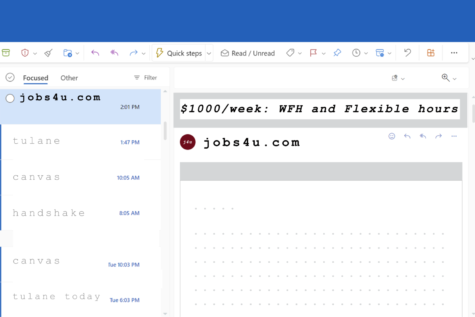OPINION | Phishing for scams: jobs, internships, Tulane email

Many students attend college in hopes of pursuing a career and preparing for the workforce; 86% of college graduates are employed after they receive a degree.
However, in the digital age, those seeking employment must be aware of potential dangers in the job-hunting process. Applying for jobs or internships requires sharing personal information, which can allow phishing scams to target applicants.
Phishing is the practice of scammers posing as institutions or individuals who seek personal information from victims — things like social security numbers and banking information. Phishing emails may also include suspicious links.
There are three distinct types of phishing. Bulk phishing refers to scammers posing as a large organization asking for information relevant to an account with them. Spear phishing occurs when a scammer poses as a trusted smaller entity or person to ask for personal information and/or money. Finally, a business email compromise is a type of spear phishing that leads to scammers hacking into the business’s accounts.
Tulane University uses Microsoft Outlook for communication. Outlook tries to protect against phishing through different policies and filtering systems. In addition, Tulane University IT Services process and filter out suspicious emails on a daily basis. However, some phishing emails can land in your inbox.
Job seekers may also have to look out for job scams, whether they occur through a fake company or scammers posing as legitimate organizations. According to the Federal Trade Commission, “fake” positions can often include jobs that require a form of payment from their employees.
In addition to these positions, job scams can include vague descriptions of qualifications and tasks and involve a variety of personal information during interview and onboarding processes.
However, some job scams may be more inconspicuous. One sign to look out for is if an employer reaches out to you or offers you a job despite not going through an interview process. A scam job offer is more likely to “hire” you on the spot or take an aggressive interest in you.
The communication might feel off as well, and the emails or messages received might be riddled with grammatical errors or come across as unprofessional. Typically, professional communications are carefully checked for errors and are formal in tone. If there is an interview or contact with the employment department, it is likely to occur through encrypted message services, rather than Zoom or email.
Messages sent by “representatives” of the company might not include further contact information and are sent through an email unrelated to the company. When searching for information about the company and its employees, the findings are likely to be inconsistent. It is especially suspicious if the representatives of the company cannot be found on the company’s website or if there is no company website at all.
The final red flags to look out for are jobs that offer higher pay than the average for that specific position — typically entry-level ones — and if the hiring process seems to be “easier” and quicker than that of other jobs. These roles are often “work from home” positions that seem too good to be true.
How do the recruiters that message potential job seekers via email have access to the personal information to do so? Recruiting sites such as Linkedin and Indeed allow recruiters to access certain information and contact potential job seekers.
In addition, some phishing emails can actually include fake job opportunities. Although many are identified as spam through filtration, there are a few that bypass the system. These fake jobs and phishing both intend to extort vulnerable people for personal information, and there are many ways you can protect yourself.
It is very important to keep track of job and internship applications. However, it can also become important in distinguishing whether or not you actually applied for that job and if it was a legitimate open position.
It is also safest to apply for a position directly on the company’s website. Recruiting websites are great ways to find ideal roles, but applying on the company’s site is the best way to guarantee the legitimacy of the role. Students should try to avoid recruiting sites that they have not heard of.
Finally, if you are unsure about a job being offered through a legitimate professional organization, you can also reach out to them and ask about the job, the legitimacy of the representatives in contact with you or any other concerns.
Overall, the technology students use can help protect them from scams, but it is always important to have the skillset and knowledge to avoid scams.
Your donation will support the student journalists of Tulane University. Your contribution will allow us to purchase equipment and cover our annual website hosting costs.



